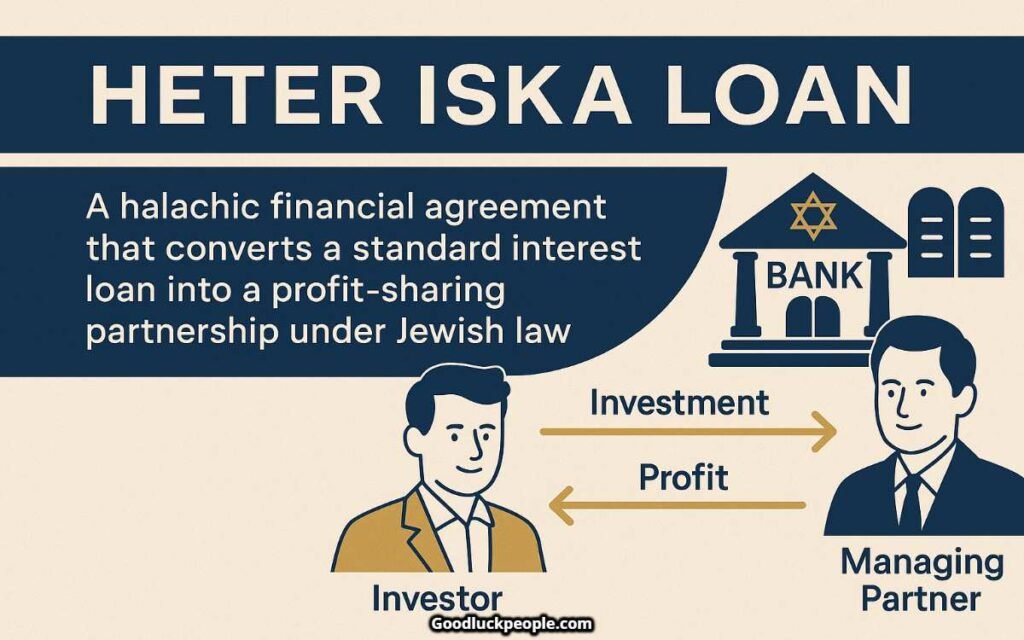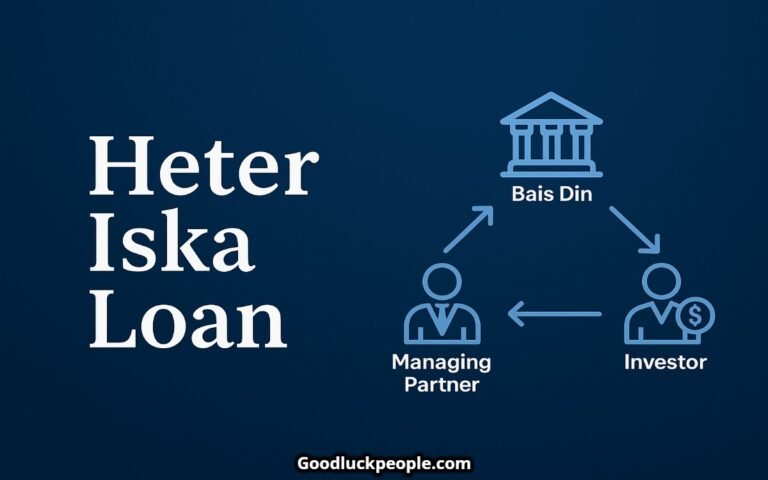My First Encounter with Heter Iska
The first time I came across the term “Heter Iska,” I was helping a Jewish colleague navigate a business loan. He explained he couldn’t accept a standard interest-bearing agreement because interest (ribbis) between Jews is forbidden under Torah law.
That moment sparked a journey of learning for me — a journey that taught me how Jewish law meets modern banking through one powerful tool: the Heter Iska.
What Is a Heter Iska and Why It Matters?

Heter Iska, which literally means “business permit” in Hebrew, is a legal and religious structure under Jewish law. It transforms a regular loan — which would involve forbidden interest — into a permissible investment partnership. Through this model, Torah-observant Jews can borrow and lend money in a way that honors halachic (religious legal) principles while still participating in the financial world.
Banks like Devon Bank and many Jewish-owned institutions use this mechanism. It’s not optional — it’s required by formal resolutions and applies across all their branches and financial dealings, including loans, deposits, and brokerage services.
The Religious and Legal Foundation of Heter Iska
The concept is rooted in the Torah’s prohibition against ribbis — the collection of interest between Jews. However, in the modern economy, interest is unavoidable in most financial models. Heter Iska is the solution. It provides a halachically approved path for Jews to participate in commerce and banking without compromising their faith.
What makes Heter Iska so powerful is that it doesn’t just offer religious compliance — it also ensures legal enforceability in both Jewish and secular courts.
How the Bank Applies the Heter Iska Loan?
The bank’s commitment isn’t symbolic. It affects every type of financial transaction: from giving or receiving loans, to handling guarantees, mortgages, savings accounts, and even brokerage and escrow services.
Sometimes the paperwork still uses conventional language like “interest” or “loan,” but in substance, all such arrangements are governed by a legally binding Heter Iska Agreement (HIA). This agreement ensures the deal aligns with halachic standards, regardless of what the documents say.
The Core Idea: From Loan to Investment
In halachic terms, Heter Iska changes the nature of a loan. Instead of one party lending money and charging interest, the lender becomes an investing partner, and the borrower becomes a managing partner. The financial return is no longer fixed interest — it’s a share of the profit.
This structure removes the ribbis problem while allowing both parties to engage in business without losing financial incentives or protections. The risk is shared, and so are the profits.
How the Heter Iska Agreement Works in Practice?
Typically, the arrangement is split: half the money is considered a loan, and the other half is treated as a business investment — say in a real estate venture or company. The returns to the investor are then classified as profits, not interest.
In some cases, a fixed payment is pre-agreed — but it must reflect realistic expectations of business performance. In daily life, it still functions like a traditional loan: same amount borrowed, same repayment schedule. But from a halachic perspective, it’s structured as a religiously valid partnership.
What If the Customer Doesn’t Know About It?
One important aspect of Heter Iska is that it automatically applies to all clients of a participating bank. Even if a customer isn’t aware of the agreement, or doesn’t understand it, the policy is still binding. This is possible because the bank’s board, acting with shareholder authority, passes a resolution declaring all relevant financial activity to be governed by Heter Iska. This resolution acts as a bylaw and applies to every transaction going forward.
When Is Heter Iska Legally Required?
The need for Heter Iska depends on the ownership and religious identity of the parties involved. If both lender and borrower are Jewish and there’s more than 20% Jewish ownership, the Heter Iska is absolutely necessary.
In cases where ownership ranges between 5% and 20%, the decision is made on a case-by-case basis. Under 5%, it’s generally not required. Still, any funds sourced from Jewish investors (called “Relevant Capital”) must be covered under Heter Iska for compliance.
Does Heter Iska Complicate the Loan Process?
Not at all. From a business perspective, the agreement changes nothing in your daily dealings. The repayment terms remain the same. The dollar amounts are unchanged. You’ll still get your mortgage, business loan, or savings account just like you would with any regular bank.
What changes is the legal and spiritual framework behind it — making sure everything complies with Jewish law without creating any barriers for customers.
Protecting Lenders Without Breaking Halacha
A major challenge with Heter Iska is ensuring that lenders are protected without violating halacha. The system has smart safeguards in place. If a borrower claims they’ve suffered a loss and can’t pay profits, they must swear a solemn religious oath, known as a “shvuah chamurah.” This must be done before a Beth Din (religious court) within 72 hours.
Additionally, all ventures must be real and have the potential for profit. Borrowers are required to notify the lender of any losses immediately. These rules keep the system fair and serious — and as a result, borrowers almost never contest repayment.
Enforcing Rights and Collateral
Just because Heter Iska avoids interest doesn’t mean lenders are powerless. On the contrary, the agreement preserves their ability to claim collateral, enforce repayment, and recover profits. In fact, in places like the UK, no borrower has ever successfully challenged repayment under a Heter Iska agreement (as reported by the Union of Orthodox Hebrew Congregations).
Guaranteeing Returns to Investors
The agreement is structured to recover the principal amount and secure profits in lieu of interest. Thanks to the combined halachic and legal backing, investors enjoy financial certainty while maintaining religious integrity. That’s the beauty of the system — it doesn’t compromise on faith or business sense.
Bank Policy and Employee Restrictions
Once the bank adopts Heter Iska, every employee is bound by it. This includes tellers, managers, and even corporate officers. No staff member can conduct or authorize a transaction that involves ribbis — not even indirect forms of interest (called avak ribbis) that are rabbinically prohibited.
Do You Need to Know the Details to Be Covered?
You don’t need to sign anything extra or even be aware of the Heter Iska in order for it to be effective. By interacting with the bank — opening an account, getting a loan, or depositing funds — you are automatically accepting the terms. That’s because the Iska is built into the bank’s structure as a permanent resolution.
Legal Backing and Halachic Stringency
To make the agreement fully enforceable, it is formalized through a ritual process called “Kinyan Suddar” in front of a reputable rabbinical court (Bais Din Chashuv). It also avoids pitfalls like asmachta (non-binding commitments) and tofsay shtara (form-only contracts). This gives it the highest possible validity in halachic and legal terms.
What If There’s a Dispute?
If there’s ever a disagreement about how the Heter Iska should be interpreted, the default approach is to interpret the document in a way that preserves its validity. The bank accepts all legitimate halachic rulings that support the legitimacy of the Iska.
Flexibility and Customization
Not every Iska is the same. It can be customized for specific needs — whether you’re buying a home, financing a business, entering a commercial partnership, or launching a new investment. The flexibility of Heter Iska allows it to sit alongside conventional loans while still keeping halacha front and center.
Real-World Heter Iska Services
Many banks now offer Heter Iska-enabled products for mortgages, business finance, and commercial lending. These banks often employ specialized staff, including Heter Iska Financing Specialists, to guide clients one-on-one through every stage of the process — from understanding the structure to reviewing the paperwork.
Why Consulting a Rabbi Is Key
Because halachic finance is complex, it’s always recommended to consult a qualified Rabbi before entering into a Heter Iska agreement. Some banks even have approved Rabbinic consultants available to assist. This step provides peace of mind and ensures that your agreement fits your level of observance.
Legal and Commercial Impact
Lawyers involved in drafting or reviewing these agreements must be extremely precise. The Heter Iska must be worded with halachic sensitivity and commercial accuracy. That’s why it’s often used by religious banks, nonprofit institutions, and Jewish-owned businesses to maintain both legal enforceability and ethical responsibility.
Public Trust and Religious Transparency
Most institutions that use Heter Iska publish a resolution or policy statement explaining their commitment. This serves the community by creating transparency and reinforcing trust — especially among religious customers who want assurance that their financial dealings are kosher in every sense.
Why You Should Use Experts?
Precision matters. If a Heter Iska is poorly written or ambiguous, it could be invalid. That’s why professionals like BBS Law offer both halachic and legal expertise. Their input ensures your agreement is solid, practical, and enforceable — without any halachic flaws.
Easy Education for Clients
To help customers understand what Heter Iska means for them, banks provide plain-English explanations of how it applies to their mortgages, business loans, or savings accounts. This keeps everything clear and accessible — even for people who’ve never heard of the term before.
Final Thoughts: A Bridge Between Faith and Finance
In my experience, Heter Iska is more than just a financial tool. It’s a meaningful bridge between religious tradition and the modern world. It helps Jewish individuals and businesses grow, invest, and succeed — all while staying faithful to halachic values. If you care about financial integrity and spiritual responsibility, Heter Iska is not just recommended — it’s essential.

